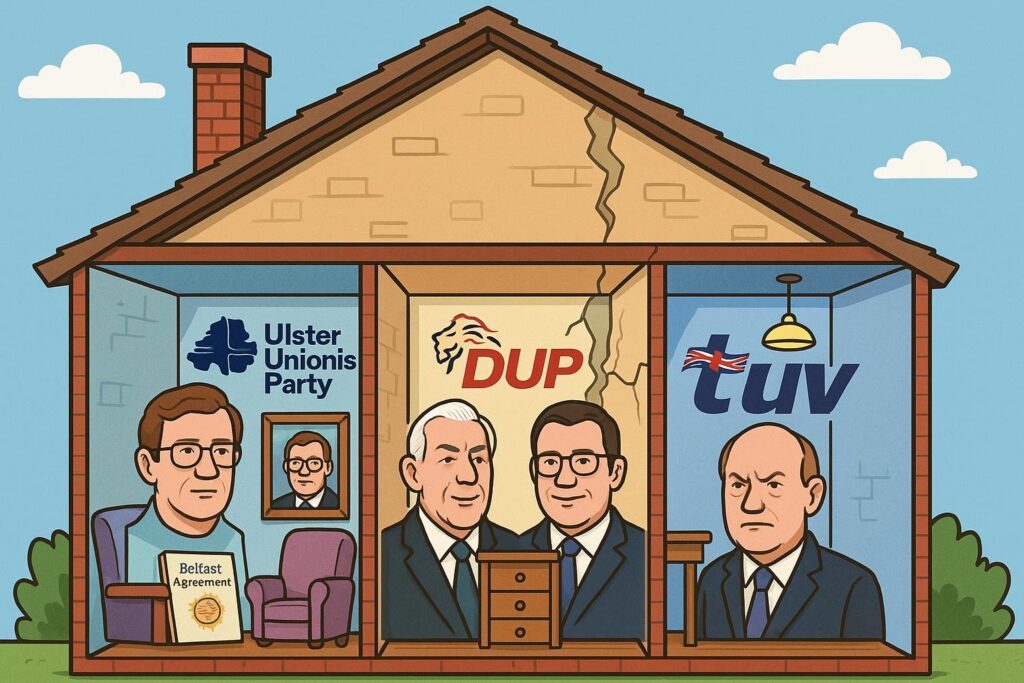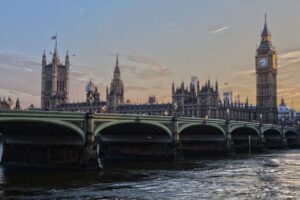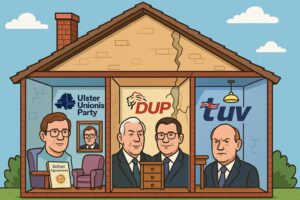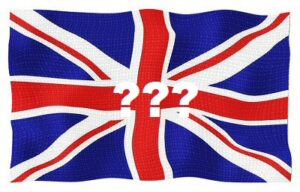Unionism- Split, Stalled or Ready to rebuild?

By Moore Holmes
who you going to vote for Northern Ireland ?
DUP 0 / 28
TUV 12 / 28
REFORM UK 4 / 28
UUP 2 / 28
OTHER 10 / 28
Unionism stands today like a house divided. UUP, DUP, and TUV – three parties, three strategies, and three sets of polling figures that prove the cracks aren’t just surface level anymore. Some call it chaos. Others call it a “broad church.” I call it very predictable. Elected unionism has been a two horse race for decades, but the emerging three way split has been in the post since last years botched return to Stormont and the unfolding slow-motion collapse of unionist confidence in the DUP.
It seems like such an obvious thing to say, but telling the truth is the most basic and fundamental expectation of politicians – and human beings in general. The first thing we teach our children is, “Do Not Lie.” Nobody likes a salesman who takes them for a ride and everyone remembers a person who pulls the wool over their eyes.
In politics, it’s tell the truth, or lose the people. To mislead the very people who entrusted you with their vote is electoral self-harm. To mistreat, mishandle or make enemies with the truth is to rupture the relationship between the representative and the public they represent.
The “Donaldson Deal” and how it was presented to the public is an irremovable stain on the DUP’s credibility. Its stench still hangs in the air as a continual and unpleasant reminder to the unionist consciousness of the DUP’s unreliability. People remember being told the Irish Sea Border was gone. They remember being assured that everything was better now. And they know that those assurances were false. Why should anyone be expected to pinch their nose and ignore the smell of fraudulence?
It would be a critical mistake for the DUP to dismiss accusations of dishonesty as the outlandish ramblings of a small rump of destructive critics. They are the reasoned conclusion of many sincere unionists who feel misguided, lied to and their faith in the party betrayed. “Trust takes years to build, seconds to break, and forever to repair.”
The DUP once dominated politics because it convinced unionists that it would hold the line where others wouldn’t. Today? Their silence on the Irish Sea Border is deafening. Is it cowardice? Is it calculation? Or worse, is it quiet acceptance? If representatives won’t represent and leaders won’t lead on the biggest constitutional fracture in living memory, then what exactly is the point of their mandate?
To his credit, Jim Allister has been a one-man wrecking ball against complacency. His voice, sharp and unrelenting, has cut through the noise and exposed weaknesses in Stormont’s pretence of normality and he is proving every bit as capable at Westminster.
His successor Timothy Gaston is also making all the right moves. Add to that the rising profile of Ron McDowell and Lorna Smyth, alongside continued media appearances from Sammy Morrison, and it paints a picture of the TUV as more than a “one-man band.” It used to be a soloist singer, now it’s more like a four string quartet, but it still has some way to go before it can be considered an orchestra. If they are to grow into a formidable unionist machine, they must platform more unionist talent and showcase their credentials as a party serious about taking a leading place within elected unionism.
Where the TUV excels is at holding others’ feet to the fire. But here’s the rub. It’s one thing to throw stones, and quite another to build a house. If tomorrow the TUV were the largest unionist party, how would they change the Belfast Agreement that they are so opposed to? What is their credible, realistic and deliverable alternative to the current power-sharing arrangements? How could they deny Sinn Fein their mandated position without rallying Republicans and turbocharging Sinn Fein support? How is it that they realistically plan to rid ourselves of the Protocol? Opposition is easy. Accountability is honourable. Delivery on the other hand requires compromise, skill, and strategy. Can they balance principle with progress? That’s their untested frontier and people may find it hard to leap into what is a complete unknown.
The DUP do possess a network of exceptional talent within its ranks. Chief among them are people like Jonny Buckley, Phillip Brett, Carla Lockhart, and even at council level, the likes of Dean McCullough. Rising stars with energy, passion, credibility and strength.
Gavin Robinson and Emma Little Pengelly, whatever their critics may say (and I count myself among them), and notwithstanding their baggage with the Donaldson Deal, have a rare gift – they appeal beyond the traditional unionist base. That matters. Especially in Northern Ireland, which has a system of proportional representation at Stormont elections. This means broad appeal isn’t a weakness – it’s a weapon. A weapon that the TUV will make no apologies for not always possessing, but one that undeniably cost them seats at the last Stormont election, and could cost them seats at the next election too.
DUP silence however on the Irish Sea Border means they are living in a constant state of sin. And it will cost them. Whether it’s shame, fear, or surrender, voters notice. And silence isn’t neutral, it’s an answer in itself. Returning to Stormont involved a commitment to “fight from within,” but voters aren’t seeing the party throw any punches. The DUP must tackle the issue head on, be up front with voters, and outline what exactly is their plan to deal with the Irish Sea Border – just as all parties must. It is something I called for prior to the Westminster election, and something that has, up to now, been ignored. They ought to do so with haste as well, otherwise a move in the right direction might be easily interpreted as a deliberate ploy to regain their sliding support in the polls, instead of a genuine initiative.
Then it comes to the UUP – a party often mistakenly viewed as the forgotten child of unionism. Too quiet to command headlines and too cautious to rattle the cage. Too moderate to exhibit strength but too conservative to forge a unique liberal identity. Internal differences within the party about where it’s going, what it stands for and who it actually is, results in a sort of paralysis that prevents it from carving out its own destiny.
That being said, I don’t think anyone should underestimate the significant role they still have to play, and the sizeable support they maintain. Again they have a broadening appeal in people like Robbie Butler, Doug Beattie and now in Jon Burrows, alongside young and fresh talent in the likes of Pete Wray and Ryan Warren. But if the moderate liberal leaning appeal does not start paying dividends electorally, it’s hard to know when, if ever, that damn is going to break.
From a bird’s eye perspective, the split within unionism doesn’t just show challenges, it also shows opportunity. One could argue unionism has never been better represented at Westminster with all of the DUP, UUP and TUV boasting representation. And the reality of a more level playing field could prompt overdue conversations about a unionist reconfiguration. The prospect of a bloc alignment around a moderate centrist party and traditionalist right of centre party carries appeal. Although admittedly difficult, it isn’t impossible and polling trends suggests voters would support some type of amalgamation.
All in all, the danger at the next election is not the diversity in unionism, but an electoral strategy of self-sabotage. And that brings me to the issue of transfers.
2027 will be an STV election. It’s not about who tops the poll, it’s about who counts at the end. It’s about preference voting and that means voting down the line in all unionist directions. Any unionist refusing to transfer to other unionists is like playing football and refusing to ever pass to a teammate because you don’t like the colour of his boots. Whatever issue you take with other parties and their representatives, refusing to transfer to other unionists is the most self-defeating approach to election day that I can think of.
Both the UUP, DUP and TUV must hammer home the same message to their base when the time comes. Transferring is not for party survival. Nor for personal gain. It is for the collective strength of unionism. Otherwise, the split becomes more than tactical, it becomes fatal.
Overall, unionism today is a mixture of opportunity and division. The DUP has immense talent within the party, but is weakened by poor leadership and dishonesty; the TUV are strengthened by truth and accountability, but untested in delivery, unable to appeal beyond its base and unclear about the future; and the UUP seem to be just floating, wrestling within itself about its own identity and too quiet to make a new name for itself. These three roads diverge in the unionist wood, but unless someone builds a bridge between them, all three may lead to overall decline. My worry is that while we are shuffling the deck chairs in our own little corner of country, our real opponents begin seizing the initiative.
Ultimately, unionism’s future won’t be secured by nostalgia for dominance, nor by shouting the loudest at Stormont’s broken stage. It will come from clarity, credibility, and yes, even compromise.
The choice is stark. Keep splintering like a never ending line of Russian Dolls, with new parties and movements emerging from the last – and in so doing, conceding ground to nationalism. Or, find a way to work together, abandon the tropes of fear, accept that no person or party has a divine right to lead unionism, operate with more humility, honesty and mutual respect, and prove that the Union is more than just a slogan, but it’s actually a future worth fighting for – and fighting for together.
This quote is often overplayed within unionism, but it sums it up in a rather timely and relevant manner. “A house divided against itself cannot stand.” Unionism should take note. Because divided houses don’t just fail to stand tall, they collapse.





